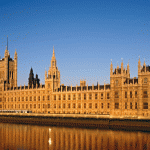This land was first turned from bog into farmland in the 12th century. The medieval monks cut drains, burnt back reeds and choked the sphagnum moss, to create rough pasture. By the nineteenth century, it had become a landscape of hawthorn hedges and oak avenues, cut with rich soil. Now, on the field edge, the whitened trunks of the oaks were drowning in three feet of standing water. My companion was ‘turning the clock back’.
The Royal Society for the Protection of Birds began buying the farmland near Bowness on Solway in 1988. In Cumbria, they also acquired a cliff-habitat for sea-birds; an artificial reservoir for lake-birds; and sections of high and low fell. Half a mile from us, on the estuary, were half a million wintering waders, ‘bar-tailed godwits, black-tailed godwits, golden plovers, grey plover, ring plover, oyster catchers, dunlins, turnstones.’ When they bought this land, it was a dry heath, cracked into deep gullies, and filled with cattle. They began by blocking the old header-drains, and used the remaining pipes, not to drain but to flood. The initial aim was to make sure that you could push a six-inch nail easily into the soil. “That tells you how easy it would be for a wading bird to probe its beak in to find food.”
But different birds needed different wetness of ground. Snipe preferred a wet rushy habitat with a few dry bits to lay their eggs on. Lapwings, however, wanted closely cropped sward and drier conditions. “But they do like the odd tussock dotted about, that they can get tucked behind, to hide. And small pools with lots of muddy edge so the chicks can get to it and feed.” Redshank tended to prefer it “more tussocky with more clumps of rush: but not wall to wall rush.”
Getting the right length of sward for the lapwings required keeping their own flock of sheep, contracting with nine different graziers, and experimenting with native breed cattle. Every August the grazing was supplemented by machine-cutting, and an artificial raising of the water-level. “If you can get the water just above the cut stems of rush, it tends to kill them off, but it’s an art in itself timing it just right.’ Curlew wanted intact mires. He took me out into the bog. “What we’re standing on here, is something like ninety-five percent water. Milk’s got more solids than this.’
Bogs don’t have a good name – our Northumbrian ancestors put monsters like Grendel in such places. The Border reiving clans used the bogs or mosses as a hiding place and a trap for their enemies. They called themselves ‘moss-troopers.’ For centuries, they had cut long paths and ditches into the wet ground, to extract peat for fuel, and then allowed the vegetation to hide the paths, and twenty-foot deep ditches. In the centre of the mosses, lay deep ponds covered in small rafts of floating sphagnum. Unwary pursuers could be lost in the bog. “We’re alright while we’re just treading carefully but I’ve had animals– cattle: they’ve got out onto the bog about thirty yards, and they’re just thrown. They start sinking up to their bellies. There was one in particular, it just wouldn’t move. We had to drag it.”
But my companion saw the bog as a paradise. “About ninety-four percent of our lowland raised mires have disappeared, so we’re just working with the last six percent.” He showed me the bog asphodel, the stag’s horn lichen, and the white beak-sedge – “one of the foods of the large heath butterfly”. He pointed to the round-leafed sundew: “because this habitat’s so nutrient-poor, it has to supplement its diet by catching flies. So these little sticky tendrils on the leaves: the fly lands on that and it catches the fly and slowly absorbs the nutrients from it.”
His favourite plant was the bog rosemary. “When I first came here and started monitoring the site I found five plants of bog rosemary in a whole day of searching. Now we’ve just mapped its distribution right across the bog. It’s just so beautiful. If I’m doing surveys at night when everything’s out, I just crush that up and rub it over my face. Just break it up and crush it,” he encouraged me, “have a whiff. It keeps the insects off to a certain degree. I wouldn’t say that it’s as good as the juice you get in a can but the next best thing.”
Now he wanted to extend the bogs. “Given time, when we’ve got the nutrient levels down, tried to get rid of some of the phosphates, the sphagnum moss will come back, which enables the peat to grow, and then that’ll eat up more of the nutrients, and you’ll eventually get bog flora starting to come through.’ This would provide even more space for the curlews.
“Amazing. And how long do you think that will take?”
“I’m not going to see it.”
“You’re not going to see it?”
“No. No one really knows. I mean, a lot of what we’re doing here is quite groundbreaking.…there’s been some remarkable changes in that fifteen years but nothing suggesting we’re getting much closer to creating ideal conditions for bog flora. So, fifty years maybe?”
Decades of flooding, mowing, grazing, and monitoring had transformed the eight hundred year-old agricultural landscape and produced sixty-five pairs of wading birds across the thousand acre site.
“When we moved here twenty-two years ago we didn’t have any. Zero to sixty-five over the years,’ he said with pride, ‘everywhere else in the country is going down.” There seemed to be something very British about the project – teetering between the absurd and the wonderful.











